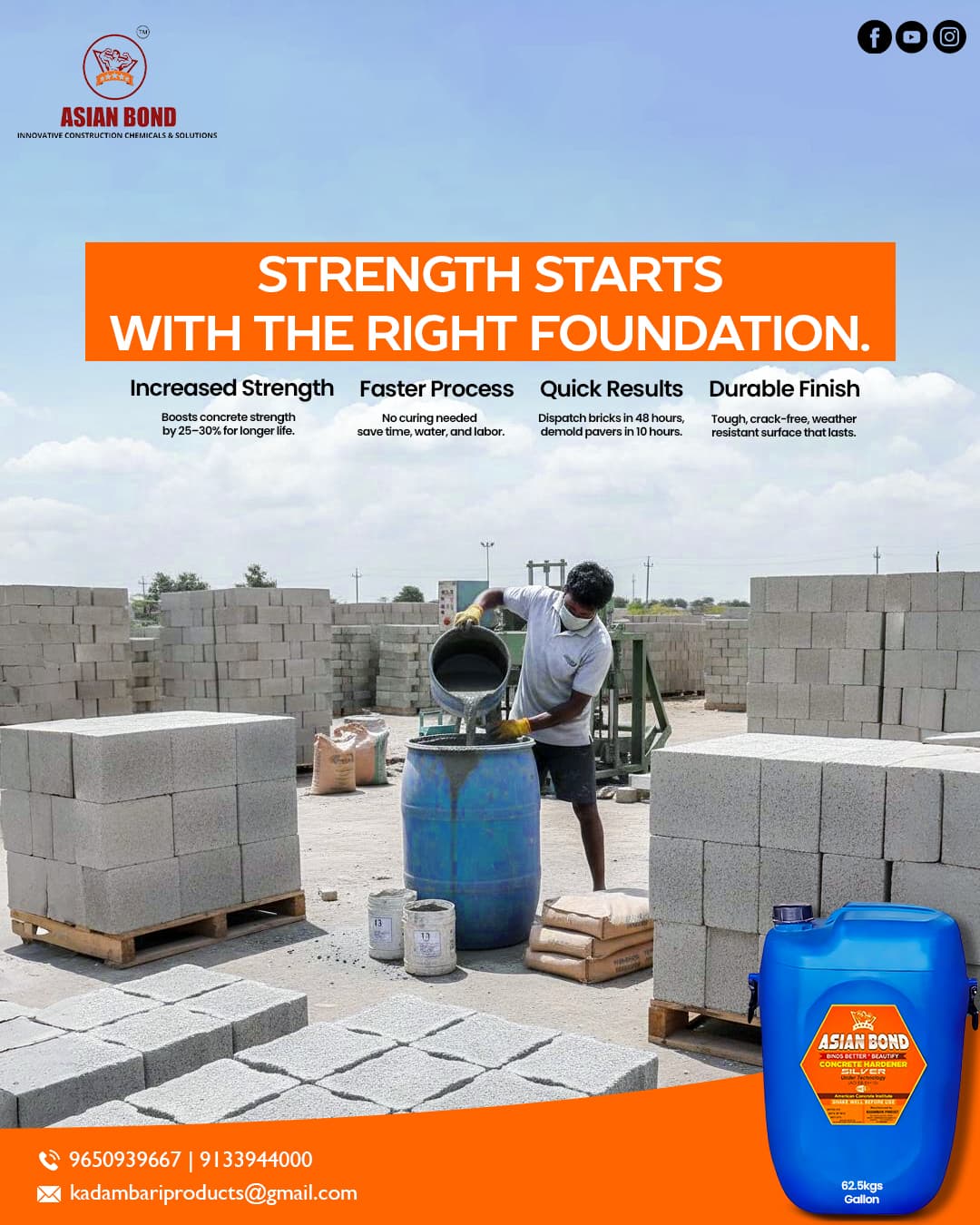The Significance of Controlling Temperature Differentials in Mass Concrete
Mass concrete is the backbone of large-scale projects such as dams, bridges, deep foundations for skyscrapers, and expansive factory floors. One of the most critical factors determining the strength and durability of these massive structures is the management of temperature differentials. When a large volume of concrete is poured, substantial heat is generated during the hydration process. If temperature control is not properly executed, cracking may occur, performance decreases, and durability issues arise in the long run.
This article examines why temperature differential monitoring should be regarded as essential in mass concrete. We also explore the relationship between thermal performance and concrete durability, and how using high-quality products—such as AsianBond, the best concrete hardener in India—can lead to stronger and longer-lasting results.
Understanding Temperature Differentials in Mass Concrete
The heat released during cement hydration is part of the exothermic process of setting. In mass concrete structures, the dimensions are so large and thick that the generated heat becomes trapped within. As the interior remains hot while the surface cools, a temperature differential develops. When this difference becomes too high, internal thermal stresses are formed.
These stresses can lead to:
- Surface or core cracking
- Weakened bonding strength between layers
- Reduced structural durability
- Early material degradation due to micro-cracks
Temperature control during curing helps prevent these risks, preserving the structure’s integrity and long-term performance.
Why Temperature Monitoring Matters
Temperature control is not merely a technical requirement—it’s central to quality management in concrete construction. The goal is to limit the difference between the hottest internal temperature and the coolest surface temperature within a single concrete mass.
Key Reasons for Monitoring
- Prevent Thermal Cracking: Controlling temperature gradients helps prevent cracks that reduce load-bearing capacity and allow moisture ingress.
- Enhance Durability: When concrete is combined with the best concrete hardener in India, temperature regulation greatly improves surface hardness, abrasion resistance, and chemical stability.
- Control Hydration Rate: Proper temperature monitoring ensures steady hydration, promoting uniform strength gain and reducing shrinkage.
- Optimize Mix Design and Admixtures: Temperature data assists in selecting the right materials from top concrete admixture manufacturers in India, balancing performance and cost efficiency.
Role of Chemical Hardeners and Admixtures
In addition to temperature management, the use of specialized materials—such as chemical hardeners for concrete and performance admixtures—can significantly enhance the structural performance of mass concrete. These materials strengthen the concrete matrix, improving its ability to endure industrial or outdoor conditions.
Chemical Hardener for Concrete
A chemical hardener for concrete reacts with free lime on the concrete surface to form denser calcium silicate hydrate (C–S–H) structures. This process increases surface hardness and reduces dusting, making it especially useful in:
- Industrial flooring
- Pavement manufacturing
- Bridge decks and parking areas
- Factory floors with heavy loads
Companies like AsianBond—recognized among the leading concrete hardener suppliers in India—offer innovative formulations that ensure durability, cost-efficiency, and compatibility with different concrete grades.
Concrete Hardener for Paver Blocks: Impact on Large-Scale Structures
Massive concrete elements like dams, foundations, and retaining walls are especially vulnerable to thermal cracking. The use of intelligent thermal management systems, coupled with suitable additives such as floor hardener chemicals for factory floors, ensures controlled temperature differentials and structural stability.
AsianBond, one of India’s most trusted concrete admixture manufacturers, provides retarders, temperature-control additives, and chemical hardeners that strengthen mass concrete and enhance its resistance to environmental stress.
Techniques for Monitoring and Managing Temperature Differentials
- Embedded Sensors: Temperature sensors installed within the concrete record data at different depths, helping engineers determine optimal cooling and curing times.
- Cooling Pipes and Water Circulation: Circulating water through embedded pipes releases trapped heat, keeping temperature gradients within safe limits.
- Surface Insulation and Curing: Controlled curing with water ponds or insulated coverings balances cooling between inner and outer layers.
- Material Optimization: Using low-heat cement, balanced aggregates, and premium admixtures from reliable concrete admixture manufacturers in India minimizes cracking risk.
Using the Right Hardeners: A Long-Term Investment
For projects exposed to India’s diverse climatic conditions, investing in the best concrete hardener in India is a key determinant of quality and longevity. These products not only improve mechanical strength but also minimize wear caused by temperature fluctuations.
AsianBond’s robust range of solutions—from chemical hardeners for concrete to concrete hardeners for paver blocks—is trusted by leading infrastructure developers. Many contractors prefer to buy concrete hardener in bulk to ensure cost efficiency and uninterrupted supply.
Benefits of Bulk Purchase from AsianBond
- Consistent product performance across multiple applications
- Reduced logistics and procurement costs
- Technical guidance for proper usage ratios
- Competitive concrete surface hardener price structures
AsianBond’s comprehensive selection of surface and floor hardeners comes with performance guarantees, setting them apart from other concrete admixture manufacturers in India.
Preventing Cracks Through Material Synergy
Thermal monitoring becomes more effective when paired with the right surface hardening techniques. The synergy between monitoring systems and quality materials ensures:
- The chemical hardener for concrete reinforces the surface, preventing micro-cracks.
- Internal thermal stability reduces differential stress buildup.
- The concrete hardener for paver blocks maintains uniform compaction and dimensional accuracy.
- The floor hardener chemical protects factory floors from abrasion due to thermal or mechanical stress.
With AsianBond’s innovative formulations, the integration of structural design and chemical enhancement ensures dependable long-term performance.
Cost and Quality Considerations
While cost constraints often tempt contractors to choose cheaper materials, investing in high-performance products yields better long-term returns. The concrete surface hardener price from established brands like AsianBond remains competitive while providing durability optimized for Indian conditions.
When customers buy concrete hardener in bulk, the per-unit cost decreases without compromising quality. Proper bulk procurement planning ensures consistent performance across batches, avoiding variations in curing or surface hardness.
